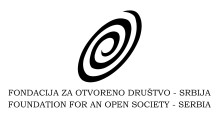23. 04. 2012
THIRTIETH MONITORING REPORT
According to the findings of the monitoring team for the period January - February 2012, the beginning of 2012 has not brought fundamentally important changes to the media sector.
The government continues with the practice of non-transparent work on regulations that are essential for the media sector, without involving its most important representatives - media and journalists' associations in the process. Namely, the associations were informed of the work on the Law on Electronic Media, which will replace the Broadcasting Law, as well as of the establishment of working groups for drafting the Public Information Law and the Law on Public Broadcasting Services, foreseen by the Action Plan of the Media Strategy, in a newspaper interview of the Minister for Culture, Media and Information Society, not directly, from which one cannot conclude who will be the members of these working groups and how they were elected, or to conclude what will be the priorities of the Government while working on these laws. The latter is particularly important, given that the Media Strategy does not give clear guidance for preparation of such legislation. A particular problem is the fact that the forthcoming elections may dramatically affect not only the fate of drafts of these laws, but also the Media Strategy, bearing in mind that the not all parliamentary parties had taken part in the process of adoption of the document or were not consulted in any way upon it. The monitoring team elaborates on this in the section of the Report that deals with the work of the competent authorities. In addition, regarding the decision of the RBA to forward a request to RATEL for making the decision that would oblige one cable operator to transmit certain TV channels, this part of the Report also contains an expert analysis and explanation of the so-called "must carry" obligation. Also, regarding the entry into force of extremely unfavorable tariff of SOKOJ for broadcasters that was determined not in accordance with the law, which further burdens the electronic media, local in particular, in this part of the Report, the authors analyze the work of the Commission for Copyright and Related Rights, which has enabled with its controversial opinion, such tariff to become effective, as well as other circumstances of importance for proper understanding of this issue.
The cases that the monitoring team analyzed in the part of the Report dealing with freedom of expression - threats to a sports journalist, violent behavior and attack on a TV crew, were selected as an illustration of still unfavorable situation in this area. The most common causes of such state are inadequate reaction of authorities and mild penal policy, with the case law in cases of attacks on journalists being recognized as a bigger problem than the regulations. The first of the court proceedings analyzed in the Report represents a real example of such a problematic case law. In particular, it demonstrates that the politicians are specially protected in court proceedings lead against them for attacking journalists. The secont indicates small improvements in the work of certain courts regarding the punishment of perpetrators of the attack on reporters and cameramen.
In the part of the Report relating to the monitoring of implementation of existing regulations, the authors analyzed the application of the Public Information Law, in particular the application of Article 82 of the said law in practice of Serbian courts, especially the issue of not holding journalists, editors and founders of a media outlet liable for damages if inaccurate or incomplete information was an accurate quote from documents of competent state bodies, particularly police reports; as for the Broadcasting Law, the Report brings the analysis of the importance of transparency of media ownership and accurate implementation of this law by RBA, in relation to the strike on TV "Avala", as well as the issue of regulation of cable program broadcasting, by analyzing the case of the cable broadcaster Kopernikus 3, which has become very relevant in anticipation of the announcement of the upcoming elections.
No new laws of relevance for the media were adopted in this period.
In the part of the Report dealing with the digitalization process, the authors analyze the issue of public consultations on amendments to the Digitalization Strategy and relevant Rulebook, the significance of these amendments for the further implementation of this process and key risks in the process of digitalization. The monitoring team also deals with the process of privatization of media - its current state, its downside for media and solutions offered in the Media Strategy.
The Conclusion of the Report contains the authors' assessment what marked Serbian media situation in this period.
The Thirtieth Monitoring Report was produced by the expert team of the law office "Zivkovic&Samardzic" in cooperation with ANEM. Here you can download the Report, in whole or in parts, by clicking the selected section below.

Section FREEDOM OF EXPRESSION here
Section MONITORING OF THE IMPLEMENTATION OF EXISTING REGULATIONS here
Section MONITORING OF ADOPTION OF NEW LAWS here
Section MONITORING OF THE ACTIVITIES OF REGULATORY BODIES, AUTHORITIES AND COLLECTIVE ORGANIZATIONS here
Section MONITORING OF THE DIGITALIZATION PROCESS here
Section MONITORING OF THE PRIVATIZATION PROCESS here
Section OVERALL CONCLUSION here
The COMPLETE REPORT can be downloaded here
-
No comments on this topic.





